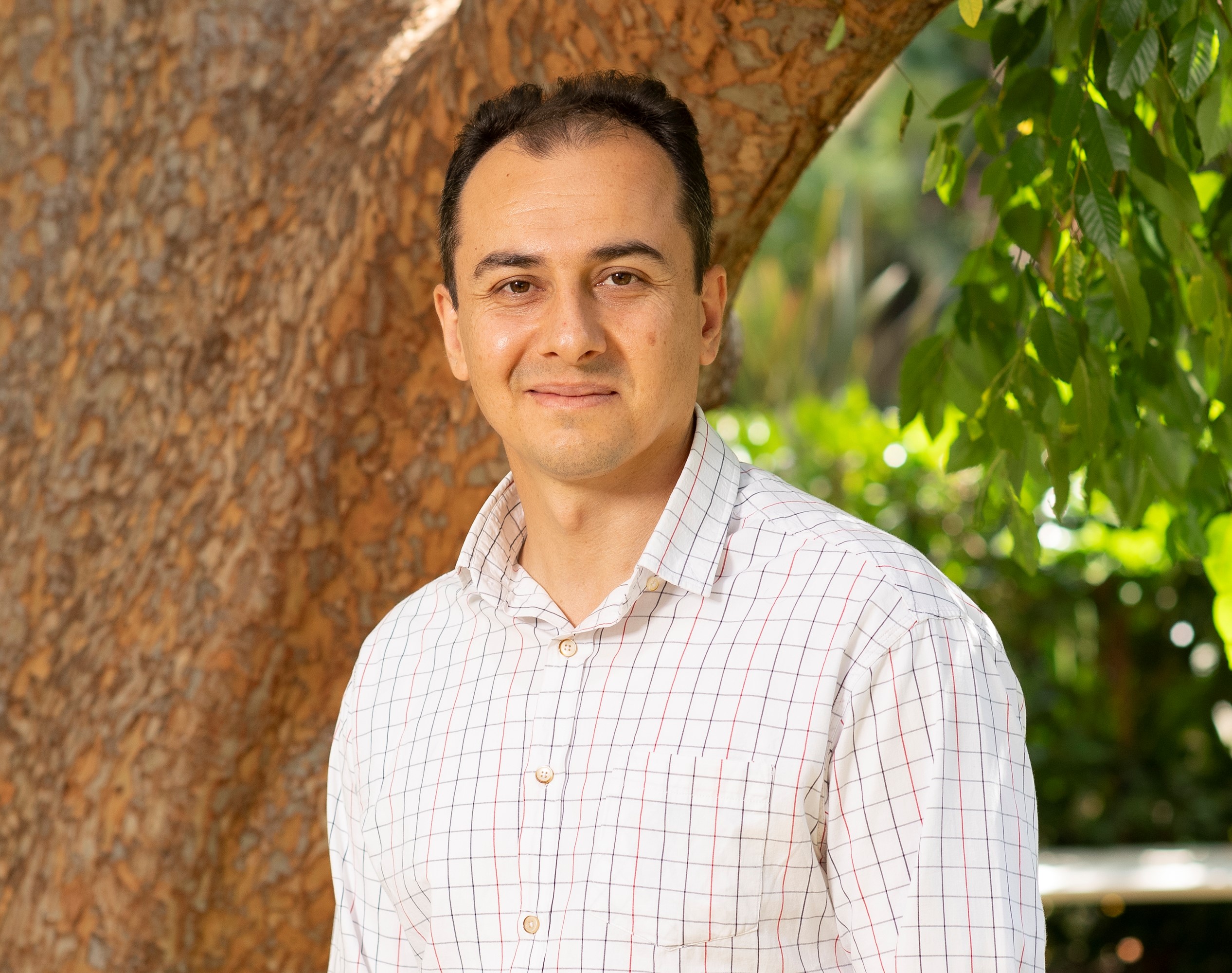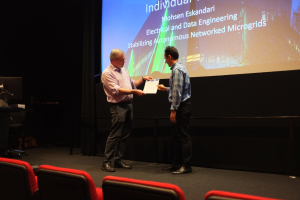
Keywords
Fields of Research (FoR)
Electrical Engineering, Power and Energy Systems Engineering (excl. Renewable Power), Industrial Electronics, Optimisation, Systems Theory and Control, Distributed and Grid Systems, Renewable Power and Energy Systems Engineering (excl. Solar Cells)Biography
Mohsen was born in Saveh, Iran. He received the B.Sc. and M.Sc. degrees in electrical engineering from Islamic Azad University, Saveh, Iran, in 2004 and 2013, respectively, and the Ph.D. degree in electrical engineering from the University of Technology Sydney (UTS), Sydney, Australia, in 2021. Since March 2020, he has been a Postdoctoral Research Associate with the University of New South Wales, Sydney, Australia. He joined the AUSMURI...view more
Mohsen was born in Saveh, Iran. He received the B.Sc. and M.Sc. degrees in electrical engineering from Islamic Azad University, Saveh, Iran, in 2004 and 2013, respectively, and the Ph.D. degree in electrical engineering from the University of Technology Sydney (UTS), Sydney, Australia, in 2021. Since March 2020, he has been a Postdoctoral Research Associate with the University of New South Wales, Sydney, Australia. He joined the AUSMURI Neuro-Autonomy project as a Research Fellow in early 2021.
Dr. Mohsen is the founder of MAI OptiTek, offering consultancy and AI services for intelligent grids and networks. He provides technical sub-consultancy services for consultant companies toward digitalization and intelligent grids. Particularly, he provides valuable advice on the design and stability analysis, parameter tuning and registration, and connection test of inverter-based energy resources including PSCAD and PSS®E modeling. He has over ten years of experience in different parts of the electrical industry. He has proven skills in handling electric engineering projects as well as a strong background in the field of automation and control.
His research interests include power systems, renewable energy including inverter-interfaced energy resources, BESSs and microgrids, wireless communication, AI-assisted control-optimization-automation, robotics, and UAV Navigation.
Dr. Eskandari was the recipient of the Higher Degree Research Excellence Award at UTS Faculty of Engineering and Information Technology in 2018 and 2019, in recognition of outstanding academic performance and the best individual HDR project.
My Grants
- T. Yu, K.Y. Wang, L. Li, M. Eskandari, L.F. Cheng, K. Qu, L. Yin, “Parallel CPSS Structure Based Smart Energy Robotic Dispatcher and its Knowledge Automation Theory”, National Natural Science Foundation of China, $130,000, 2018.
- M. Eskandari, “FEIT HDR Research Collaboration Experience Grant”, University of Technology Sydney, $4,000, 2018.
My Qualifications
- PhD, University of Technology Sydney, Sydney, Australia, 2017 - 2021
- MSc, Islamic Azad University, Saveh Branch, Saveh, Iran, the Islamic Republic of, 2011 - 2013
-
BSc, Islamic Azad University, Saveh Branch, Saveh, Iran, the Islamic Republic of, 2000 - 2004
My Awards
- UTS International Research Scholarship (IRS) (Nov 2016)
- UTS President’s Scholarship (UTSP) (Nov 2016)
- UTS FEIT Higher Degree by Research Publication Award (Dec 2017)
For publishing high quality, high impact research
- UTS FEIT HDR Research Collaboration Experience Scholarship (Apr 2018)
- UTS FEIT Higher Degree Research Directors Commendation (Nov 2018)
In recognition of outstanding potential and an excellent individual HDR project
- UTS FEIT Higher Degree Research Excellence Award (Dec 2019)
In recognition of outstanding academic performance and the best individual HDR project
My Research Activities
- Stabilizing Autonomous Networked Microgrids for Future Resilient Grids
Modern power systems have been developing through high penetration of the power electronic-based renewable energy resources and distributed generation units into conventional power systems. Mixing up the power systems and the power electronics technologies along with the smart grid facilities, the microgrid concept has gained full attention for addressing the resiliency issue of modern power systems through autonomous operation capability. However, it is not an easy task to stabilize an autonomous microgrid due to the dominated inverter-interfaced generation units and complex power flow. The microgrid is an emerging technology that facilitates the integration of renewable resources into power systems, and definitely, would be the cornerstone of future/modern power systems.
Goal
- Frequency and voltage control of inverter-dominated microgrids while preserving power-sharing and securing dynamics stability.
- The impact of battery energy storage systems on the economy dynamics of microgrids with a focus on linking economics (including the steady-state performance) and dynamics (inertia and frequency support).
- Developing accurate physics-aware mathematical models of microgrids for paving the path toward the Digital Twin of microgrids.
Hypothesis
Toward Net-Zero carbon emission energy and power systems.
The microgrid concept is the key solution to address the resiliency issue of modern power systems.
Resilient grids with autonomous multi-microgrid systems
- Intelligent Autonomy for Autonomous Vehicles and Systems
Neuro-autonomy: neuro-inspired perception, navigation, and spatial awareness for autonomous robots, vehicles, and systems.
Goal
- Autonomous UAV/Robotics navigation.
- Deep visual SLAM.
- A unified module for perception (including localization), path planning, and path tracking (control), to convert raw sensory (visual) data to navigation control signals.
- Impedance Emulation and Shaping for Inverter-Interfaced Energy Resources
The electric components are identified by their impedances and the impedance model of an electric system reveals its characteristics. The dominant inductive impedance of bulk power systems in generation and transmission levels and its compliance with the f-P and V-Q control loops have resulted in harmony for the stable operation of bulk power systems for more than a century. However, inverters reveal arbitrary impedance characteristics, depending on their controllers, that have put the stability of power systems at risk. This project introduces a new concept for developing and designing inverters based on the impedance shaping concept.
Goal
Developing and designing impedance shaping-based controllers to solve stability issues of modern grids hosting inverter-interfaced distributed energy resources.
Hypothesis
A universal controller for inverters utilizing impedance shaping consistent with inertia-impedance strength indexes of electrical grids.
- Revisiting and quantifying inverter-dominated grids' inertia and impedance strength indexes
The impacts of the inverters's controllers on the grid strength indexes should be clarified and quantified. The existing virtual impedance and virtual inertia solution fail to stabilize the future grids and require effective solutions.
Goal
Stabilizing the inverter-dominated grids.
Hypothesis
Exploring milestones toward Net-Zero emission electric power and energy systems with 100% inverter-based resources.
- Studying the bidirectional impact of grid-connected grid-forming inverters and the grid
The grid-connection of grid-forming inverters, mostly for connecting battery energy storage systems, is a trending solution to address weak grid stability issues.
Goal
The impacts of the inverter controller on the grid inertia and impedance.
Controller design to stabilize the inverter and strengthen the grid.
Hypothesis
The interaction of grid-forming inverters through the grid can raise critical stability issues.
- Intelligent Control, Management and Protection Techniques for Inverters-based Energy Resources and Microgrids
Studying the application of deep learning AI-based techniques for addressing uncertainties, complexities, nonlinearities, and computational hardness of conventional methods for control, energy management, and protection of inverter-interface energy resources and (micro) grids.
Goal
- Exploring potential applications of deep learning AI in modern grids including inverter-interfaced renewable energy resources and distributed generation units.
- Handling large-scale data associated with high penetration of renewable energy resources, behind-the-meter batteries, and EVs.
- Identifying unrecognized features of modern power systems hidden in time series data given by frequency measurements and PMUs.
- Developing an intelligent inverter stability tool (IST).
- Utilizing AI to complement physics-aware transients-dynamics-economics models in the context of Digital Twin.
Hypothesis
Developing a digital twin (a virtual model) of inverters and microgrids with an intelligent decision-making capability.
- Wireless Communication Aided Accurate Localization for Autonomous Intelligent Vehicles and UAVs
Lidar and vision-based SLAM methods need sensor fusion for intelligent vehicles for safe path planning and path tracking for autonomous driving in dense urban environments. Modern wireless communication networks with fine beamforming capability of massive multi-input-multi-output antennas can assist existing visual SLAMs to create accurate results.
Goal
- Utilizing the power of mmWave communication for accurate localization.
- RIS-equipped UAV (RISeUAV) for providing aerial LoS service in modern 5G/6G wireless communication systems.
- RIS-assisted localization for UAVs and intelligent vehicles.
My Research Supervision
Supervision keywords
Areas of supervision
Power systems, Renewable energy, Inverter-interface energy resources,
AI-assisted control, optimization and automation
Autonomous Vehicles and Systems
Robotics and UAV Navigation
UAV-assisted Wireless Communication
Wireless communication and autonomous ground vehicles.
Prospective PhD Candidates:
I am looking for good candidates who are passionate about doing research with great encouragement. Please send me an application email addressing the following issues:
-
Your motivation for taking a Ph.D. course and choosing me as your supervisor.
-
Are you looking for a funded position or do you have sufficient funds to cover your expenses? If you have available funds, as far as I find your research proposal of good quality I would support your application for a PhD admission. Otherwise, you may apply for UNSW scholarships which are highly competitive. For that, you need a good Bachelor's degree with some journal publications. So, please describe your BSc degree, score, and the ranking and reputation of the university you have graduated. Please, clarify if you have done any research and/or contributed to a research project/team, and have any publications or plans to publish. Also, explain your industry experience, engagement, and projects been involved in.
-
You need (at least) two academic reference letters. Please send me names, email addresses, and links to the academic profiles of your referees.3
-
Also, you need a good research proposal, which needs to be demanding and trending for your PhD. It helps to be productive in terms of publication and be demanding for the industry. Please note that preparing a research proposal takes time and requires a research background. Therefore, if you already have some studies, have done some research, have an idea in mind, and have prepared a research proposal, send it through. The structure of the research proposal should be in the format given below. Otherwise, we have two options: 1) you have some research interest and will read academic papers and industry reports about your area of interest and write a research proposal which I assume takes a couple of months to write a good and promising research proposal. 2) I will give you a topic and you will study and write a research proposal.
Research proposal:
The topic of your research proposal is very important and greatly impacts your success at your Ph.D. and your future career. Therefore, the topic must be trending and practical. Also, it affects your application success for scholarships. The research proposal should be in single-column double space, 3 PAGES, and must be fluent and understandable including a figure describing the idea.
Please make your research proposal with the following structure:
Abstract (100 words): briefly explain the context, research gap, and intended methodology.
Background and research gap (1-2 paragraphs): a brief introduction and problem statement.
Research questions, methodology, and innovations (3-4 paragraphs): technical and scientific difficulties to address the problems and intended novelties (e.g., using AI and how).
Significance and Benefits (1-2 paragraphs): what are the importance for the research community and what are the benefits for human societies and environments, etc?
Feasibility and available resources: (1-2 paragraphs): please discuss the feasibility of the research considering available resources and timetable.
References: should not be too old and reveal that you are familiar with the state-of-the-art technology, please cite some of my publications to show the relevance of the research to my research background.
Please take your time and read and edit your proposal several times to make sure it is fluent and understandable for others. The problem statement, research questions, and novelties should be clear.
